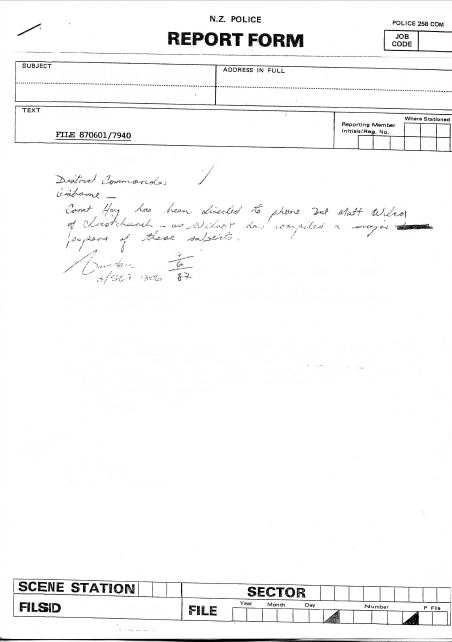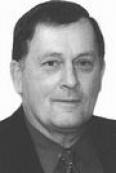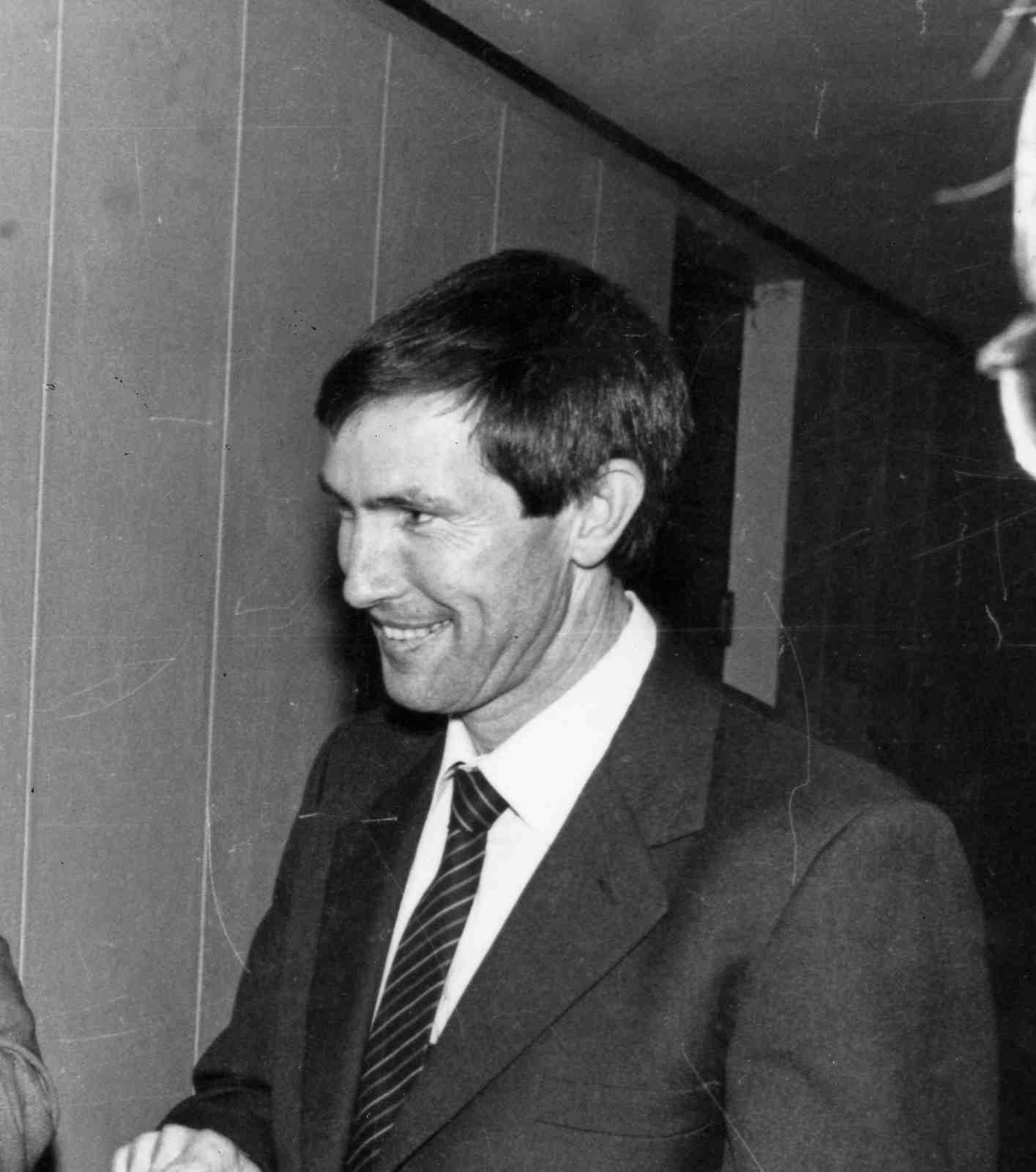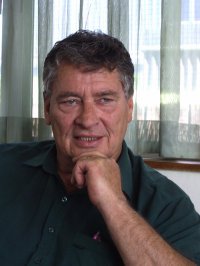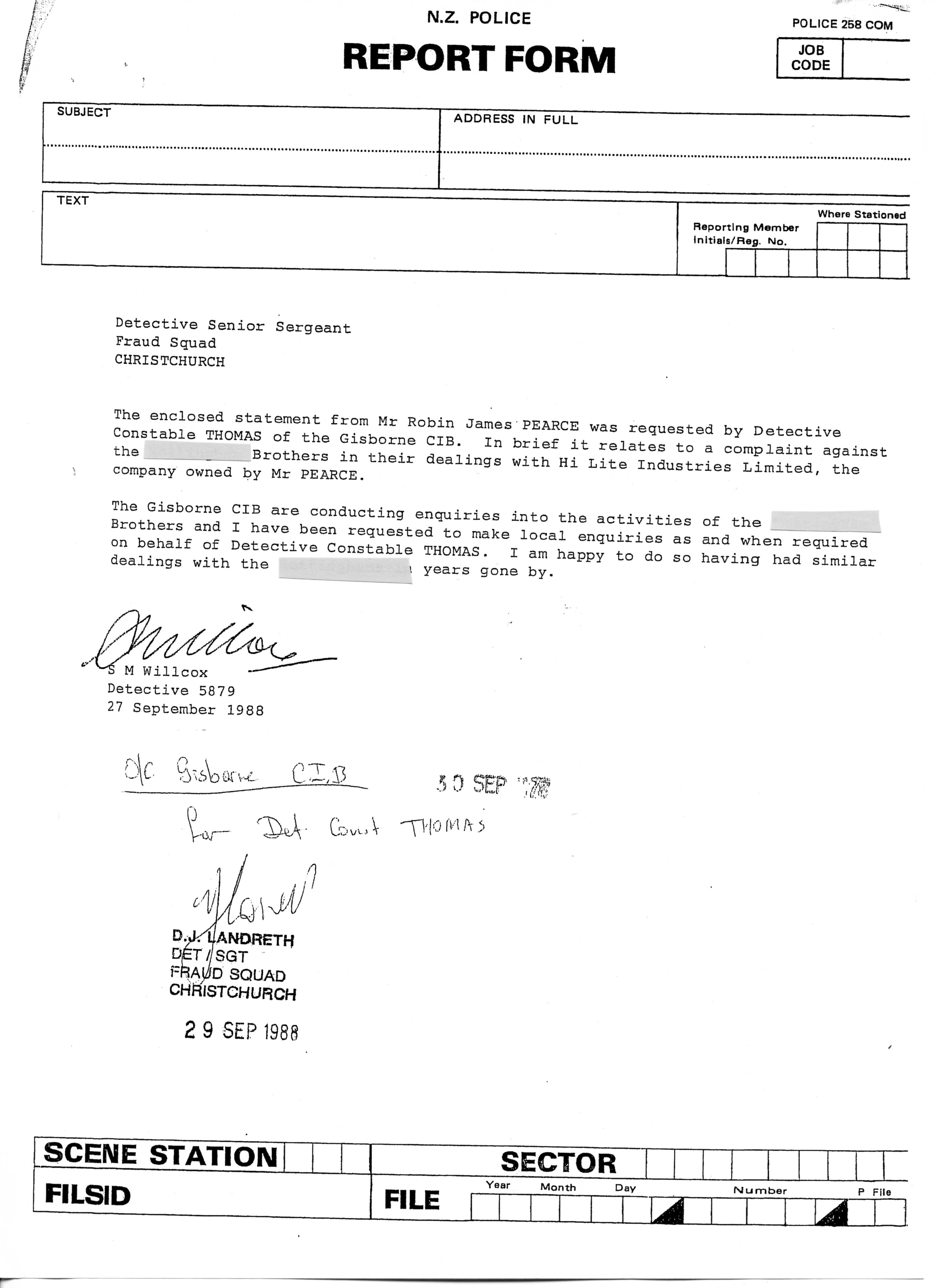The thing that Jenni McManus had failed to grasp was that Corrupt Detective Stanley Matthew (Matt) Willcox (Christchurch CIB) had masterminded a serious commercial collapse. Corrupt Gisborne Detective Malcolm John Thomas had been the primary co-conspirator. Senior Gisborne CIB officers had however conspired to keep Willcox’s involvement a secret.
Despite numerous freedom of information requests they failed to provide documents they knew to exist, documents that proved Willcox’s very early involvement in the attempts to destroy business projects the men and their financiers had invested millions of dollars in.
These early attempts by Willcox et al, whilst not successful had still caused major financial loss; losses that had certainly not been budgeted for. The attempts by Willcox to stop the restaurant getting a licence had cost the men in excess of $300’00.00 in legal expenses and lost revenue.
The reason why the police concealed evidence of Willcox’s involvement is simple, they knew the history and the likelihood of a substantial damages claim and the criminal prosecution of the officers involved. Willcox, whilst narrowly escaping a criminal conviction had been found guilty of an assault. Willcox and his police partners had a history of assaults. On one occasion a constable Cox one of Willcox’s plain cloths assigned partners had been convicted and sentenced to prison; Willcox was present when that assault occurred.
Subsequent to his trial Willcox used his continuing power as a police officer to lay numerous false criminal charges against one of the brothers in revenge. That brother had given evidence against Willcox’s at the trial.
In 2009 however twenty two years after Willcox’s criminal conspiracy the officers involved had long since retired (the corrupt Gisborne cops choosing local body politics as a lucrative re-birthing) or
left the police force, Willcox included. As a result no one in the police legal section knew the significance of any of the documents they were releasing.
The first to surface was a memo written by Senior Sergeant Alan Davidson, one of the corrupt cops that Jenni McManus had spoken to at length in August/September1988. The memo records the fact that Detective Stanley Matthew Willcox telephoned Alan Davidson on the 4th June 1987. During that call he advises Davidson that he has compiled a large dossier on the brothers. Davidson however scratches out the word dossier; why? The term dossier was used by police to describe an official file, what Willcox had compiled was not an official police document, it was a personal obsession.
Davidson’s memo is addressed to the district commander, at that time Superintendent P. W. Wiseman. Davidson advises Wiseman that he has instructed Constable Hay to telephone Detective Matt Willcox. Within a matter of days Detective Malcolm Thomas and Willcox were getting on like a house on fire, Willcox then sent Thomas a copy of his file. Hay and Thomas then pay a visit to the brothers bank and without a search warrant ask the bank manager for copies of the mens banking records. The manager, realising the illegality of Detective Thomas’s demand sends the cops away – no warrant no documents. Detective Thomas didn’t return, he had however started the rumour campaign. Hay notes this in a memo to Wiseman:
I have discussed this application with many CIB and uniformed members in this station. Apart from remarks that the XXXXXXXXX are of doubtful character I have not been able to locate any documentation which could substantiate the general opinion of members.
Thomas had obviously hoped to get information on the brothers financiers and other business arrangements. This was doubtless
after discussion with Willcox in Christchurch. The behaviour had been Willcox’s Modus operandi on many previous occasions – resulting in serious financial loss.
Constable Hay had also called Willcox and requested the dossier Davidson refers to in the memo, Hay was an honest cop, Willcox didn’t send Hay the file – Constable hay makes note of this fact in a memo to Wiseman on the 9th June 1987:
Despite sending a message to Christchurch CIB for any documented background on the applicant nothing has come forward.
Further evidence of rumours being promulgated by CIB officers in particular is to be found in an internal police letter dated 5th August 1987; two months after Willcox’s conversation with Alan Davidson.
The document is written by the district commander, Superintendent P. W. Wiseman, and addressed to the Detective Senior Sergeant, at the time Detective Laurie Naden. Obviously Naden had written to Wiseman trying to further Willcox’s endeavours. Wiseman appears to be very frustrated with Naden, Thomas and the other CIB officers and their continued rumour mongering and writes:
I’ve heard a lot of rumours about the XXXXXXXXX but to date seen no facts to support same. To now object we need facts to support such opposition. None are on this file as yet. Until such evidence is available we will leave things as is.
Chief Inspector Whiro Ratahi noted the behaviour of Detectives Naden, Thomas and the other CIB officers with respect to the brothers in a taped telephone conversation fourteen months later (Click to hear the tape). Ratahi believed that they were all totally corrupt, but he and Wiseman had hit a brick wall trying to stamp the corruption out.
It would have been to risky, Willcox could not afford to have the brothers alerted to his criminal activities and anything constable Hay received ran the risk of being released later with any subsequent freedom of information request.
Willcox had to remain behind the veil, he decided instead to get one of his corrupt Christchurch police associates Detective Byrne’s to write to Hay instead – more on Detective Byrne’s later. Willcox and Thomas however kept in touch and continued, behind the scenes, to interfere in business transactions and contractual arrangements.
Fast forward to September 1988. Willcox and Thomas are working together calling creditors and inciting the theft of chattles from the mens businesses Thomas, located in Gisborne, having first made unsolicited telephone calls to the creditors , referred everyone to his corrupt police friend the ex-detective sergeant Steven John Dimery. Dimery was now self employed, working as a private investigator/repossession agent and owned Gisborne investigations – Dimery made a small fortune.
One of the alleged creditors that Thomas had contacted was Hi-lite Industries, Hi-lite was not however a legitamate creditor. They had received payment in full, in fact over paid to the tune of $26’000.00 – funds that were destined for other very deserving creditors had Pearce not been deceitful. The owner of Hi-lite, Robin Pearce, was aware of the over payment. Hi-lite Industries was, however, in serious financial difficulties and Detectives Willcox and Thomas presented a way out.
Together, assisted by Pearce’s Christchurch solicitor Alexander Lee they would conspire to invent a new contract enabling, they thought, Hi-lite to repossess equipment without genuine legal entitlement.
This is where a second very interesting document appears. As previously stated Willcox and Thomas had already known each other for around sixteen months. Together they had been engaged in a malicious plan to destroy the brothers and their business. In this document, also released in 2009 Willcox is writing to his commanding officer. The memo dated the 27th September 1988 Willcox appears to intentionally mislead detective sergeant Landreth.
Willcox is pretending to know nothing about the matter, just that he has been requested by a detective Thomas of Gisborne to conduct inquiries. He does however acknowledge a prior relationship between the Brothers and himself. There were no similar investigations that he had been involved in. What he does not tell the Sergeant is that these prior dealings had involved his own near conviction for assault and his subsequent malfeasant conduct.
In the normal course of events, however, police protocal would have required detective Thomas to have made his request first to the commanding officer of the Christchurch CIB, this did not occur. Had Thomas used the normal chain of command he risked being assigned someone other than Willcox, he couldn’t risk that.
Following a civil court action wherein Hi-lite lost their spurious claim using the contract Thomas and Willcox had falsified Alex Lee, the corrupt Solicitor and Detectives Thomas and Willcox then set about attempting to make further false allegations in an attempt to keep Hi-lites claim and Thomas’s false criminal charges against the brothers alive.
What they had not realised, however, was that the brothers were already onto the conspiracy. For some weeks the brothers had been telephoning the people McManus had mentioned in her telephone conversations with a Mr Egglestone. The brothers investigations had uncovered Thomas’s involvement in the repossessions and they had also long since suspected Willcox’s involvement.
The brothers obviously aware that what McManus had printed was false had embarked on a campaign of investigation, taping telephone calls to all involved (whilst posing as repossession agents and various other ruses). Real evidence of Willcox’s involvement was to come with a telephone call to Hi-lite Industries accountant, Kieth Mitchellmore. Mitchellmore had total responsibility for the accounts at Hi-lite. He knew that the genuine contract had been with Property Stock. From the time Thomas and Willcox, however, became involved Mitchellmore had taken a back seat.
All dealings were suddenly now being handled by Robin Pearce personally, with the assistance of Willcox, Thomas and Lee. Not at all surprising given that Mitchellmore knew the truth obviously it would have been a big ask and a highly risky move to have involved Mitchellmore in their criminal conspiracy to steal, defraud and falsely accuse.
Thomas knew he was loosing, he also knew that Lee was headed to the United Kingdom to live permanently. He telephoned willcox and explained his plan to falsely allege that a conversation had occurred outside the Court. He then sent an internal police telex to Willcox asking him to interview Alexander Lee.
It was however too late. The evidence against the four conspirators had been obtained and Lee was telephoned and told that the brothers had the goods on him and Pearce. Lee left the country and Willcox’s and Thomas’s corrupt attempts to yet again falsely accuse collapsed. Willcox was so annoyed by this, that he unwisely telephoned the brothers to let them know that Lee had informed him of the taping.
Detective Thomas and Phillip Cooper, the crown solicitor, would also mislead a district court judge by applying to have the brothers bail conditions altered; alleging that the creditors had been threatened – as you can hear it had nothing to do with threats, no one had ever been threatened. Thomas simply relied on the colour he had created (Mafia, guns and drugs) with Jenni McManus and her NBR articles and his word as a police officer. The sole motivation for his application was to attempt to stop the brothers collecting evidence against Willcox, the corrupt creditors and himself – although, to a certain extent he had been to late in closing the stable door; the horse had already bolted.
So just what had happened between the 9th June 1987 when constable Hay had observed that there was absolutely nothing that could justify the generally held belief of some officers towards the brothers (Davidson, Thomas et al) and September 1988 when Jenni McManus had acquired the belief that the brothers were, to use her words, “scumbags of the worst order”? In a word, nothing; absolutely nothing.
At least nothing the brothers had done; to be so deserving of McManus’s “generally held belief” and the articles she and Berryman had published.
A lot had, however, occurred within a small clique of corrupt police officers; with Matt Willcox, his cadre of bent police mates, corrupt crown solicitors and those prepared to turn their back on the rule of law – Jenni McManus had been taken for a ride and the fool that she really was. By nothing less than a group of banjo playing inbred cops, who had in the past resorted to barbed wire and shotguns, and a back water swamp hack journalist who worked for a newspaper that allegedly “didn’t have the guts to print it“! In towns like that Jenni they printed what ever they liked – that is until the Courts stopped them – Gisborne Herald Co Ltd v Solicitor-General [1995] 3 NZLR 563, 569 CA.

